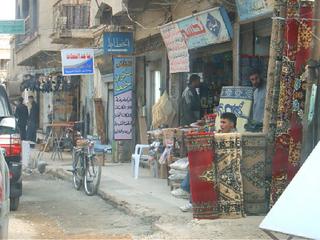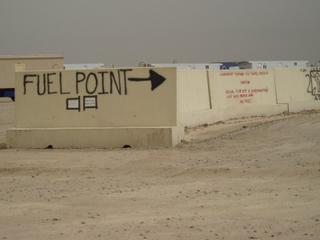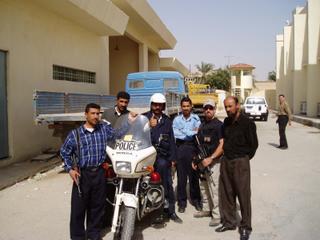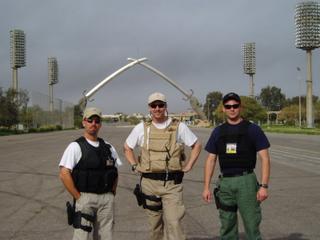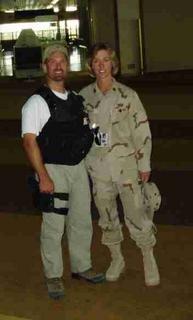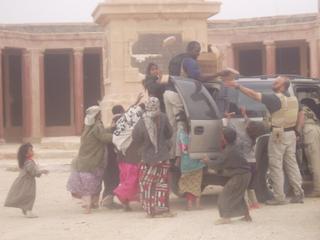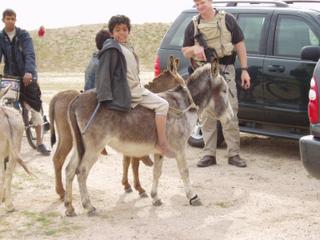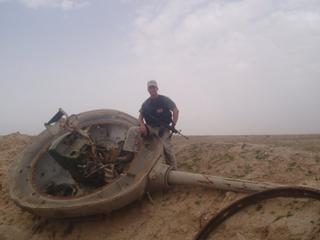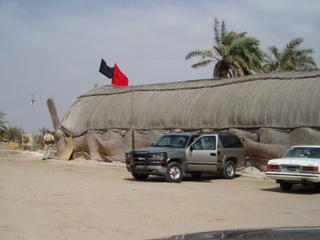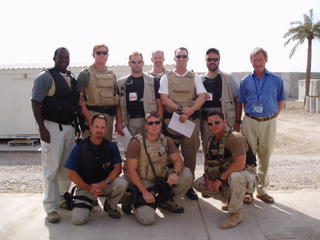
With only two days left in Iraq, my time at the CPA draws to a close. Yet despite my desire to return home to family and friends, I must admit that I feel somewhat melancholy about leaving Iraq and the people I've served with on this detail. During the short time we have spent here, I have experienced things that most people will never have the opportunity to see or do. I've dined on mutton and curry at the village hut of an Iraqi tribal chief, constructed of reeds and thatch. I've wandered the halls of the Presidential Palace in Baghdad and stood in front of the great crossed swords of Saddam's Victory Stadium. I've driven through the cities of Al Kut, As Samawa, An Nasiriyah, Al Amara and Al Basra, and seen the beautiful mosques and souks, or markets, that thrive in these cities. I've met military and civilian coalition members from Denmark, Great Britain, Italy, Holland, Wales, Ireland, and Japan. Each of these events have rewarded me in an intangible way that cannot be explained without experiencing it for yourself.
Certainly, there are many things I am glad to leave behind. Mortar attacks and nighttime explosions top the list, as do roadside IED's, car bombs, and the constant threat of attack against coalition personnel. The need to travel in armored vehicles, wearing 45 lbs of body armor and ammunition gets old very quickly. The inability to stop your car and walk around town without being injured of killed is a very strong factor influencing our desire to go home for awhile.
Yet, I leave Iraq having also seen many positive changes occur since my arrival. New businesses are opening and many Iraqi's are learning the value of capitalism. The infrastructure of the city is improving daily, with new water and sewage plants, electrical stations, and schools. Sanitation workers are slowly removing twelve years worth of garbage from neighborhoods affected by the decade-long embargo against Iraq. Children are returning to school and roadways are being repaired after years of neglect. Despite the negative portrayal of events by our media, a greater percentage of positive things are occurring daily in the cities and countryside than what one is led to believe. The media routinely reports negative events and rarely portrays the accomplishments taking place in Iraq on a daily basis.
Conversely, I have also seen a stalemate in the progress of security for the Iraqi people and the promise of self-government which is truly independent of Western rule. The prospective Iraqi election and dissolution of the coalition appears less likely to happen by July 1st than it did 60, or even 30, days ago. Coalition troops continue to battle extremists in the cities of Fallujah, Najaf, and Amara. Politicians continue to argue the future of Iraq, the makeup of it's government, and the role of religion in the future of this country. In my opinion, coalition leaders do not fully understand the influence of Islam and the stark difference between the western and Arab cultures. The western ways of conducting business and our handling of inter-personal relationships differ from that of the Arabs as much as it did for the early pioneers and Native Americans in the 19th century. Until the Iraqi's can govern themselves and provide security for their own people, U.S. servicemembers and other coalition forces will continue to be looked upon as an occupying force by the Arab world.
My tour in Iraq has spanned the spectrum of human emotions. Whereas I have felt mostly at ease throughout this tour, I have also experienced moments of intense fear and helplessness, greater than I could ever imagine. One quickly come to terms with their own mortality when nearby rocket or mortar explosions jar them awake at night.
Much like the aftermath of the 9/11 tragedy, my time spent in Iraq has left me with an renewed sense of patriotism for my country and my flag. More personally, I come away from this experience with a greater appreciation for my wife, my family, and my friends. We are truly blessed to be Americans and to have family and friends whom we can turn to it time of need. I wish nothing less than success to the members of the coalition as it continues it's progress in Iraq. My time here, however, has ended. It has been a fascinating trip.

